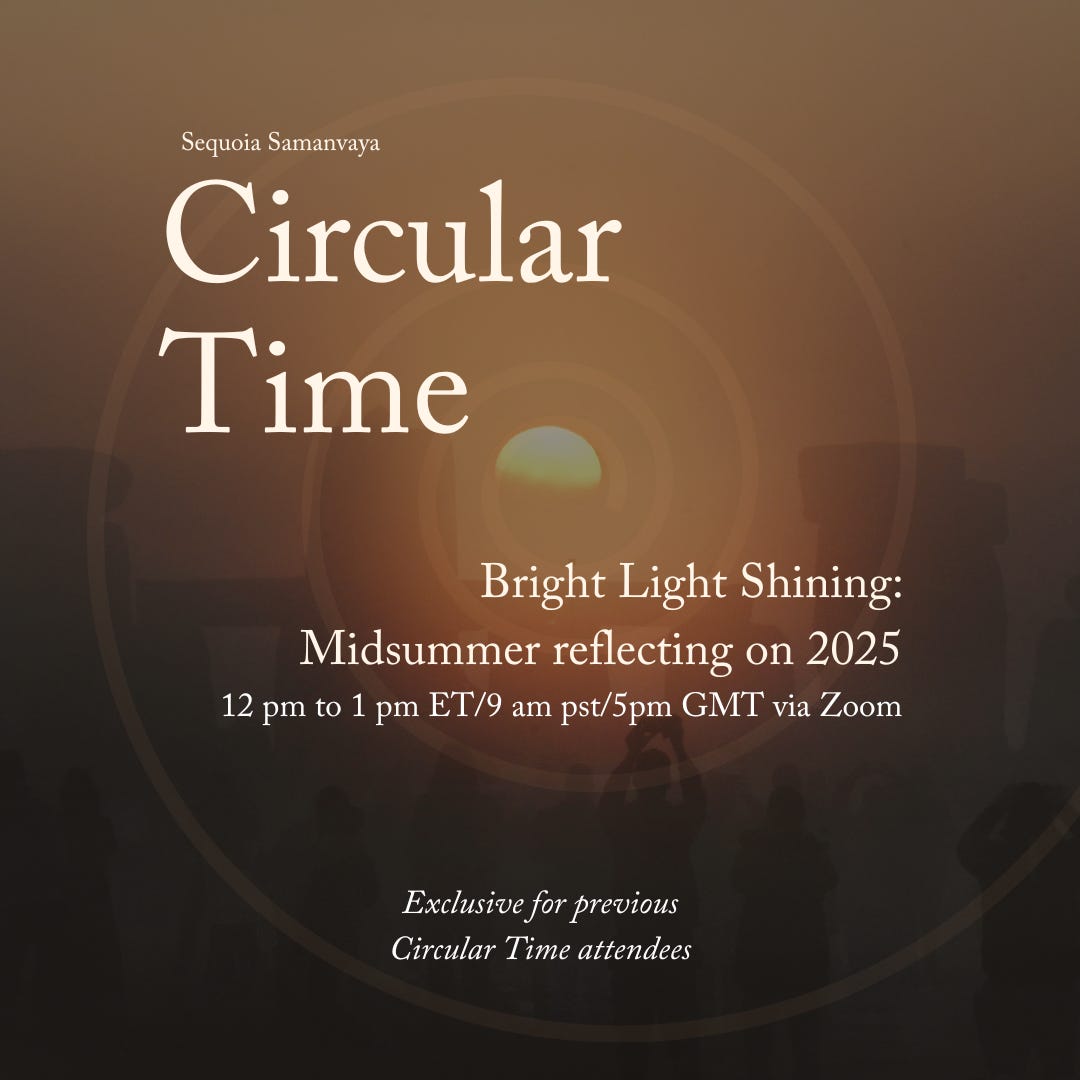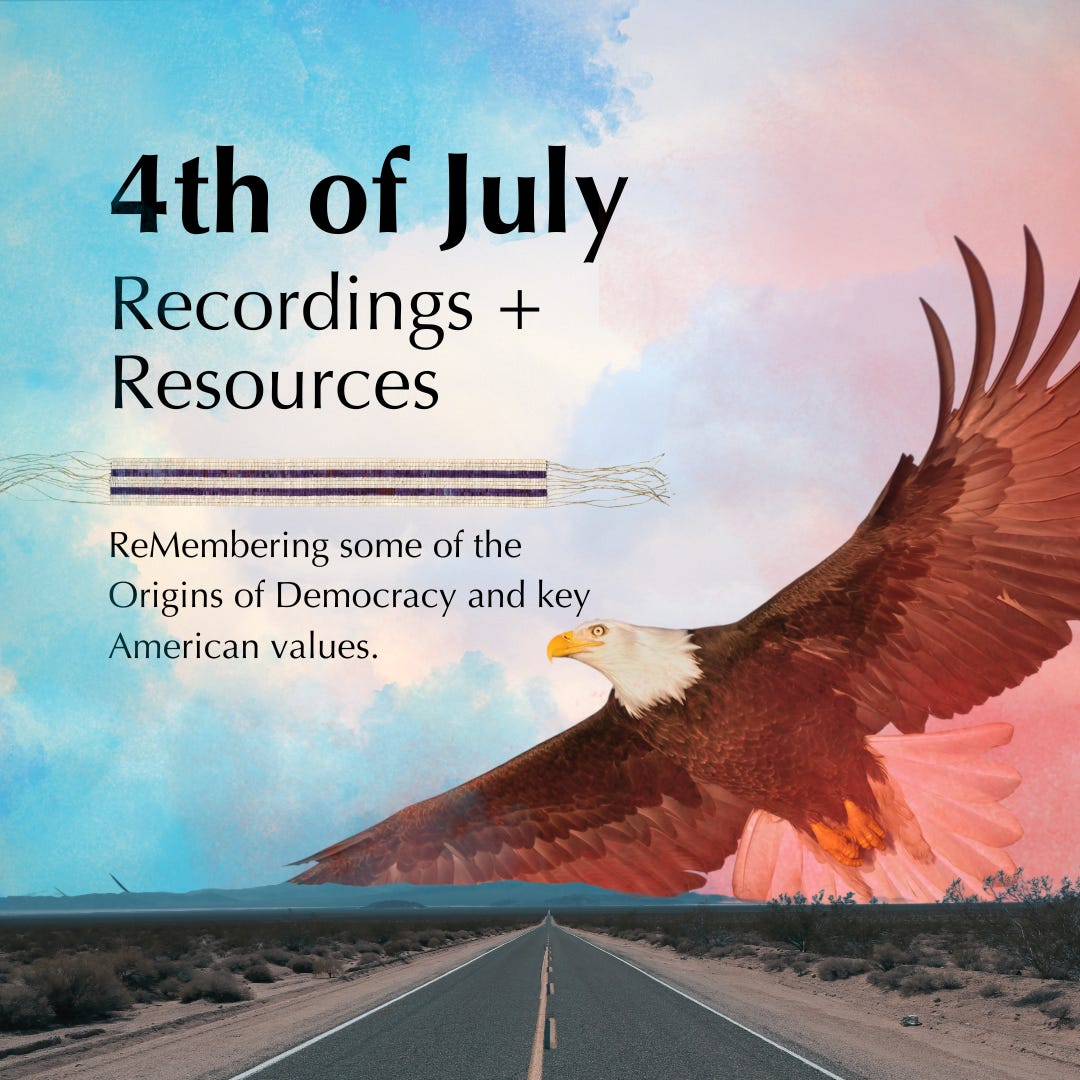This coming weekend in the United States is the Fourth of July, aka Independence Day, aka America's birthday. 2025 marks 249 years since the signing of the Declaration of Independence in Philadelphia.
How do we want to relate to this moment?
To answer that question, let's take a brief look back at 1776.
At the time, there were 2.5 million colonists in 13 colonies. 90% of them were involved in farming, mostly subsistence farming. There were roughly 500,000 enslaved peoples, or roughly 20% of the total population, who primarily grew tobacco, rice and indigo (cotton became a major crop after 1800). Estimates of indigenous peoples east of the Mississippi River hover around 250,000 people who probably spoke over 80 different languages at the time of the Revolutionary War, though this number, in particular, is hard to pin down. It represents a severe loss of indigenous peoples to pre-colonization due to disease, displacement/starvation/loss of land, and violent conflict. The cultivation process of one of the colonists main crop, corn, was learned from the original peoples of this land. Corn, flax, wheat, timber (especially for ship building) and (beaver) pelts were the most common.
The British Crown sometimes respected the rights of indigenous Americans (though rarely of enslaved people from Africa) - in 1763, the British Crown had reserved the area west of the Appalachians for indigenous Americans. The colonists bristled at this constraint, accusing King George III of preventing the population growth of the colonies. In the ensuing battle, most Native peoples tried to stay neutral; Britain offered freedom to enslaved people who joined their forces.
Spaniards living in New Spain (now Mexico) supported the American revolutionaries (they were not friendly to the British); yet the American Revolution also indirectly influenced the Mexican Revolution. To the North, Americans tried to persuade Quebecois to join their cause; they, however, were loyal to the British Crown. In 1775 and 1776, the Continental Congress invaded Quebec and Nova Scotia - and lost.
So how, now, do we choose to interpret this history and these relationships? How do we understand "freedom" and "independence" as it was understood then.... and as it has shifted and changed over the nearly two centuries since then?
And how do we understand the relationship between "land" - that sacred source of food and life - and 'a country' or a 'nation' - that political identity that often entails shifting borders, meanings, and sometimes drastically different interpretations of 'freedom'? What is the 'land of the free and the home of the brave'?
Most likely, the phrase, 'land of the free and home of the brave' was, on some level, at least originally a reference to indigenous peoples. The British subjects, afterall, were not free- not the way their indigenous neighbors were. And they consistently enslaved others (ie, people of African and also Native descent). And the term "brave" was also the term for an Indian warrior.
These days, who do we look to for the meaning of 'freedom' and 'bravery'? Of the kind of 'independence' that actually only arises from 'independence'?
These are not answers that we can answer alone.
But we do think we can't truly learn what it means to be regenerative without also inquiring into land and soil and soul, which also means into country and dirt and spiritualities. Into identities, communities, and criss-crossing borders of ideas and possibilities.
It's a bit of a happenstance that July 4 is also very close to midsummer (which officially is June 24/25) - just a little over a week later. It certainly serves as the major 'mid-summer' holiday - a colorful, public-parade orientated and highly social holiday that is designed to bring people together and to bond people into a particular historical narrative.
Our friends at Sequoia Samanvaya have been thinking about some of these questions for some time. For the last two years, they have offered some teachings around the indigenous roots of American Democracy - including with Kristine Hill, who is now a staff member at Rē. This year, they are offering the recordings and resources from the previous two years for anyone who wants to listen (they are preparing for their 2026 offerings now.... 2026 will be a big year!)
You might be interested in these.
And, if not, we always welcome hearing from you - how are you connecting with this holiday? What is the land teaching you about working with these complex layers of history?
This week, we are also bringing you a round up of news and related articles that we have found helpful in keeping abreast of what is happening. We try to focus on a combination of 'big stories' and 'hopeful stories', all circling around some aspect of the environment.
I. Environmental Protection & Conservation Efforts
Guardians of the Trees - Kinari Webb, M.D.
This rural community fought one of the country’s biggest gas-powered data centers — and won - Grist
Colorado’s rural electric co-ops are determined to go green - Grist
Wild Service: Why Nature Needs Our Help - Nick Hayes
The All We Can Save Project - All We Can Save
II. Policy, Politics & Advocacy
For Sale? - New Rules on the national parks - New Rules
Republicans' Big Beautiful Bill is the worst bill ever for our communities and the environment - League for Conservation Voters
Trump EPA 'community change grants' program aims to address food waste - Grist
III. Geopolitics, Culture & Historical Context
Iran, Christian Nationalism and the Apocalypse - Straight White American Jesus podcast
Iran and the U.S., Part One (goes back to the 1950s) - Throughline podcast
The Book of Trespass: Crossing the Lines that Divide - Nick Hayes
IV. Organizational & Systemic Change / Collaboration
In a new era for the nonprofit ecosystem, collaboration is key to survival - Candid
What to know about seeking foundation grants right now - Candid
UNESCO appoints Indigenous co-chairs to protect languages and knowledge amid climate crisis - Grist
Upcoming events
Sequoia Samanvaya
July 1, 12 pm to 1 pm ET - Circular Time Bright Light Shining: Midsummer reflecting on 2025 - Exclusive for previous Circular Time attendees
Democracy’s Origin Stories: Resources for 4th of July - featuring a conversation with Indigenous peacekeeper Kristine Hill, Indigenous linguist and scholar Dr. Montgomery Hill, Rev. Sara Jolena Wolcott, and other guests.
Growing Roots:
July 21, 2025: Mountain TOP programming - More info soon





